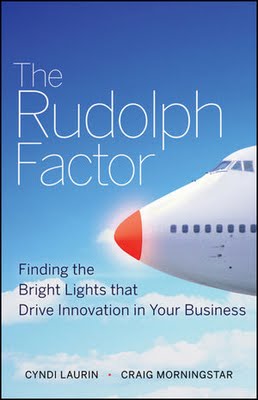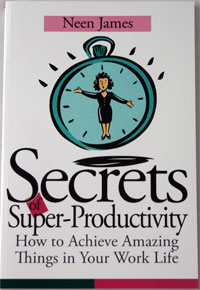
Though I didn't have a copy of this book to review prior to the holidays, I thought this book's name alone warranted a mention this week.
"The Rudolph Factor: Finding the Bright Lights that Drive Innovation in Your Business" by Cyndi Laurin and Craig Morningstar (Wiley, July 2009, $21.95) uses The Boeing Company as an example of how a large corporation needs only to focus on employees who are hyper-creative yet sometimes not in traditional leadership roles to ensure future success.
Laurin and Morningstar recommend turning to those employees who "light the way" for their coworkers, the "Rudolphs." They say "Rudolphs" are highly-engaged, creative thinkers that populate about 10 percent of every organization. But for the most part, they aren't the traditional company leaders, and their talents ,may go untapped, the authors state.
"Depending on the business culture, political structure, and reward system, Rudolphs either let their nose glow, or they cover it in mud so as to not create any career-limiting moves with their non-traditional, and generally unconventional ideas," Laurin said. "Obviously, the more progressive and innovative the business culture, the easier and safer it is for Rudolphs to contribute business-growing innovations or cost-saving solutions to their company's bottom line."
In the last decade, the "Rudolphs" of The Boeing Company helped the giant aircraft manufacturer turn around a cruscial division that was the edge of collapse.
Paraphrased from the book’s inside flap:
The Boeing Company aircraft manufacturers has struggled with the cyclical nature of demand for commercial aircraft. Between the challenging integration of the Rockwell and McDonnell Douglas employees into Boeing, competition from Airbus, and market pressure, the company was facing serious financial consequences ... until it managed a remarkable turnaround.
"The Rudolph Factor" explains how Boeing's journey back to excellence began a decade ago with the Boeing C-17 Globemaster, an Air Force cargo aircraft. Hampered by a toxic culture and struggling to stay alive, Boeing C-17 management and employees partnered with the Air Force to fix the program. They — all 10,000 of them — instituted a new set of progressive practices from the top down and from the bottom up.
This experiment was a smashing success. The C-17 Program continues to be so successful, in fact, that its leadership and employee involvement principles are currently being instituted throughout Boeing.
"The Rudolph Factor" uses Boeing C-17's success as a platform for teaching organizations how to elicit and benefit from the creative, revolutionary thinking of current employees. A small percentage of hypercreative, out-of-the-box thinkers can be the catalyst for organization-wide reform — if you can recognize and nurture their special abilities.
In a Wiley press release supporting the book, Laurin and Morningstar recommend the following ways to motivate the Rudolphs in your organization (a la The 12 Days of Christmas):
1) Give them ample time to shine. No one knows your company and its customers as well as your employees. After all, they are the ones closest to the processes that work and those that don't. That's why they are best suited to uncover the solutions that will make your organization a success in the New Year. But great innovation doesn't necessarily happen overnight, so it's important that you give your employees plenty of time to brainstorm their bright ideas.
"Allowing your employees time to brainstorm each day will likely produce some great cost-saving ideas," asserts Laurin. "Even if it's just for fifteen minutes. Some of the most progressive companies begin and end each workday with a five-minute huddle. It's a great opportunity for the Rudolphs in your workplace to shine!"
2) Include your Rudolphs in the reindeer games. Management often has difficulty solving problems due to a natural level of disconnect between their position and the work itself. "Start listening to the unlikely voices amongst your workforce," suggests Morningstar. "If a red nose is shining, pay attention! Include workers in strategy meetings, and ask for their opinions. You may be surprised at the solutions and innovation that is generated this way."
3) Be on the lookout for a red nose. If you aren't sure how to spot the Rudolphs in your organization, here's a tip: one of the most obvious signs of a Rudolph is that they light up when talking about their work. Maybe not literally like the nose of the most famous Rudolph of all, but you can definitely see and feel their passion for their work. To pinpoint your Rudolphs, look for a face that is shining bright and listen for a passionate voice, and that will be the person who can help you through your company's foggy nights.
"If you want to inspire this phenomenon in others, make sure you take the time to connect with your employees everyday," explains Laurin. "Ask them about their projects and ideas for improvements, and watch them light up with excitement when they speak."
4) Keep their curious spirit alive. Another surefire sign of a Rudolph is that they ask a lot of questions. And they have a tendency to ask those questions even when it isn't the most popular thing to be doing. It's important for you to understand that when your employees are asking questions, they are engaged and generally trying to gain a better understanding of the company's goals, which should be encouraged.
"Make sure you are not inadvertently discouraging their questions," warns Morningstar. "Encouraging questions in your employees helps you to develop a dialogue with them, and it encourages a dialogue for them amongst one other—precisely the way most great innovations come to life!"
5) Don't put your Rudolphs (or their ideas) in the corner. Most employees want to work in an environment that is safe, supportive, and offers them an opportunity to make a difference—it's our human nature. Rudolphs have a natural tendency to see their world through a lens of potential and opportunity. Encourage this type of thinking in all of your employees by listening to their ideas—even if they seem unrealistic or just plain crazy.
"Some of the greatest innovations in history seemed unrealistic or un-marketable at first," Morningstar explains. "For example, the concept of a wireless telephone was being discussed at the famous Bell Labs in the 1950s. Look at how many decades it took to come to fruition, and think about all the great ideas that could be simmering in your own organization."
6) Congratulate them on a job well done. One of the more interesting characteristic of Rudolphs is that they are not interested in self-promotion. Instead, they are genuinely vested in wanting their organization to succeed. And while they aren't looking for personal accolades, it's still a good idea to let them know that you've noticed their good work. It will keep them motivated in the long run.
"Make sure that all your employees understand how their individual work has contributed to the organization this past year," says Laurin. "It may seem trite, but a simple acknowledgement goes a long way in today's business cultures. Try taking advantage of the season and send a simple holiday card with a hand-written note thanking them for a job well done. You may be surprised at just how far a small gesture will go."
7) Reward your Rudolph with action. The greatest reward a Rudolph can experience is seeing their ideas in action. Encourage all employees to share their ideas, and have a system in place for reviewing them. Remember, there is nothing more de-motivating than being asked for ideas only for them to end up in some organizational black hole.
"Be prepared to respond to ideas quickly and briefly," says Morningstar. "And seek more information if the idea is not clearly presented. The only way to keep the creative Rudolph juices flowing is to encourage all ideas, good or bad, and to never discourage an employee from offering suggestions."
8) Encourage your herd to be, well, a team. Rudolphs are natural team players, and when they need help, they are generally not afraid to ask. To bring out the Rudolph-ness in everyone at your organization, make sure that the doors of communication are open. And give people an opportunity to collaborate with one another, if necessary, so that ideas can be shared, refined, and encouraged within your organization.
"It's amazing to meet workers who don't even know the person sitting in the cubicle next to them," says Laurin. "You may be missing out on some great ideas by simply not encouraging the great minds in your company to work together."
9) Be willing to branch out from the eight reindeer you know. Encourage diversity in thought as well as other types of traditional diversities. Many employees intentionally stop sharing ideas if their work environment is not conducive or if the perception is that management doesn't care. This can result in "million-dollar" ideas forever locked in people's minds.
"Make sure your organization recognizes diversity in thinking as a legitimate and unique human quality," adds Morningstar, "And you may also want to consider hiring employees with non-traditional or diverse backgrounds who may offer a completely unique and value-added perspective."
10) Give them some ownership over the workshop. Rudolphs are natural entrepreneurs, a quality many managers will tell you is a great asset to an organizational team. To encourage entrepreneurial thinking, be open with your employees about business information. Employees will feel a greater sense of ownership over your business if they have a basic understanding of the organization's current strengths and challenges.
"Keep in mind that this may require some basic training for all employees," says Laurin. "Every employee should understand the fundamentals of profits and loss, budget creation, and how their work contributes to the bottom line. Without a clear value proposition to employees, it will be difficult to reap the rewards of innovative thinking."
11) Let all your reindeer lead the sleigh (in their own special way!). Rudolphs tend to be natural leaders because of the way they define leadership. Rather than looking at leadership as a position on the organizational chart, encourage employees to lead from where they are.
"This can be easily accomplished by offering a new definition of leadership," asserts Morningstar. "Try to define leadership as 'a commitment to the success of people around you' or 'connecting people to their future.' With the appropriate verbiage in mind, all employees can start leading today!"
12) Always offer your Rudolphs the resources they need. Give them the tools, training, and resources they need to contribute to the organization's bottom line.
"And remember, your people are your most sustainable competitive advantage, and many are just chomping at the bit to make a significant impact to the bottom line," Laurin conclude. "So when you see those red noses shining bright, why not give them the chance to guide your company's proverbial sleigh this year?"


